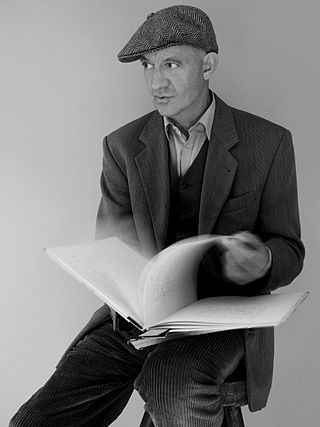Related Research Articles

Ralf Winkler, alias A. R. Penck, who also used the pseudonyms Mike Hammer, T. M., Mickey Spilane, Theodor Marx, "a. Y." or just "Y" was a German painter, printmaker, sculptor, and jazz drummer. A neo-expressionist, he became known for his visual style, reminiscent of the influence of primitive art.
Albrecht Dümling is a German musicologist and music critic.
Michael Riedel is a contemporary artist who lives and works in Frankfurt. His work operates at the interface between applied graphics and free art. Since 2017, he has been professor of painting/graphics at the Hochschule für Grafik und Buchkunst in Leipzig.

Mixtur, for orchestra, 4 sine-wave generators, and 4 ring modulators, is an orchestral composition by the German composer Karlheinz Stockhausen, written in 1964, and is Nr. 16 in his catalogue of works. It exists in three versions: the original version for full orchestra, a reduced scoring made in 1967, and a re-notated version of the reduced scoring, made in 2003 and titled Mixtur 2003, Nr. 162⁄3.

Bazon Brock is a German art theorist and critic, multi-media generalist and artist. He is considered a member of Fluxus. He was a professor of aesthetics at the Hochschule für bildende Künste Hamburg, the University of Applied Arts Vienna and the University of Wuppertal.
Friedrich Christian Flick, also known as Mick Flick, is a German art collector.

Gerhard Rühm is an Austrian author, composer and visual artist.
Michael Diers is a German art historian and professor of art history in Hamburg and Berlin.

Tilman Baumgärtel is a German author, media theorist, curator and journalist. He is currently professor of media theory at the University of Applied Sciences, Mainz.
Erhard Frommhold was a leading German writer and art historian.

Natias Neutert is a German artist, author, poet, orator, and translator who lives in Hamburg and Berlin.

Open Casket is a 2016 painting by Dana Schutz. The subject is Emmett Till, a black 14-year-old boy who was lynched by two white men in Mississippi in 1955. It was one of the works included at the 2017 Whitney Biennial exhibition in New York curated by Christopher Y. Lew and Mia Locks. The painting caused controversy, with protests and calls for the painting's destruction. Protests inside the museum lasted up to two days.

Salomon Korn is a German architect and an honorary senator of Heidelberg University. Since 1999 he has served as chairman of the Jewish Community of Frankfurt am Main and since 2003 as vice president of the Central Council of Jews in Germany.

Laura Bruce is an American contemporary artist living in Berlin.
Feminist Avantgarde: Art of the 1970s is an international series of exhibitions and a book publication curated and edited by the Austrian art historian Gabriele Schor about feminist art in the second half of the twentieth century.
Robert Suckale was a German art historian, medievalist and professor at Technische Universität Berlin.

Ingo Kühl is a German painter, sculptor and architect.
Stefan Koldehoff is a German journalist, art market expert and non-fiction author. He became known through numerous publications and his work as culture editor of the Deutschlandfunk.
Christopher Roth is a German film director, artist and TV producer.
Ellen Gronemeyer is a German contemporary painter and has held a junior professorship at the Kunstakademie Düsseldorf, the academy of fine arts of Germany's federal state of North Rhine Westphalia, since 2017.
References
- ↑ "Texte zur Kunst: "Die Zeitschrift ist nicht links, sondern neo-individualliberal."". berlinergazette.de (in German). Retrieved 2017-03-16.
- 1 2 Arend, Ingo (2015-10-11). "Furios sperrig". Der Freitag (in German). ISSN 0945-2095 . Retrieved 2017-03-16.
- ↑ "Interview with Isabelle Graw of Texte zur Kunst - artnet News". artnet News. 2015-11-27. Retrieved 2017-03-14.
- ↑ Zimmermann, Michael F. "Zum frühen Tod des Kunsthistorikers Stefan Germer: Der Freiheitswille und die Tradition". Berliner Zeitung (in German). Retrieved 2017-03-15.
- 1 2 Arend, Ingo. "Wir sind links!". die tageszeitung. Retrieved 2017-03-16.
- ↑ Arend, Ingo. "25 Jahre "Texte zur Kunst": Glorreiche Entmystifizierer". die tageszeitung. Retrieved 2017-03-16.
- ↑ "Interview with Isabelle Graw of Texte zur Kunst - artnet News". artnet News. 2015-11-27. Retrieved 2017-03-16.
- ↑ "Imprint – TEXTE ZUR KUNST". www.textezurkunst.de. Retrieved 2017-03-16.
- ↑ "Kunst Wenn die alte Möhre zimbelt". Frankfurter Allgemeine Sonntagszeitung. Frankfurter Allgemeine. Retrieved 1 January 2014.